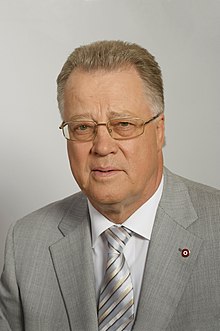Guntis Ulmanis
| Guntis Ulmanis | |
|---|---|

Guntis Ulmanis
|
|
| 5th President of Latvia | |
|
In office July 7, 1991 – July 7, 1999 |
|
| Prime Minister |
Ivars Godmanis Valdis Birkavs Māris Gailis Andris Šķēle Guntars Krasts Vilis Krištopāns |
| Preceded by | Kārlis Ulmanis |
| Succeeded by | Vaira Vīķe-Freiberga |
| Personal details | |
| Born |
September 13, 1939 |
| Nationality |
|
| Political party | Latvian Farmers' Union |
| Spouse(s) | Aina Ulmane |
| Children | Guntra Alvils |
| Alma mater | University of Latvia |
| Signature | |
Guntis Ulmanis (born on September 13, 1939) is a Latvian politician and was the fifth President of Latvia from 1993 to 1999.
Guntis Ulmanis was born in Riga on September 13, 1939. His grandfather was the brother of Latvian leader Kārlis Ulmanis. In 1941, Guntis Ulmanis and his family were exiled to Krasnoyarsk Oblast, Siberia, Russian SFSR. In 1946, he came back to Latvia, but his family was not allowed to settle in Riga and so they stayed at Ēdole in the Kuldīga area of the Latvian SSR.
In 1949, the remainder of the Ulmanis family was supposed to be exiled again, but Guntis Ulmanis was able to avoid that fate, as his mother remarried and his surname was changed to Rumpītis. They then moved to Jūrmala, where he went to school. After graduating, he entered the economic faculty of the Latvian State University.
After completing his studies in the university in 1963, he was drafted into the Soviet army, where he served for two years. In 1965 he joined the Communist Party of the Soviet Union. He began working as an economist at a construction site and was later promoted to tram and trolleybus administrator in Riga. He was then advanced to the position of deputy chairman of the planning committee of the Riga Executive Committee (city government). However, his past family ties with President Ulmanis were discovered and he was sacked in 1971. He then worked at lower positions in the Riga municipal service system. For some time he worked as a teacher of construction economics at the Riga Polytechnical Institute and of economic planning at the Latvian State University.
...
Wikipedia
